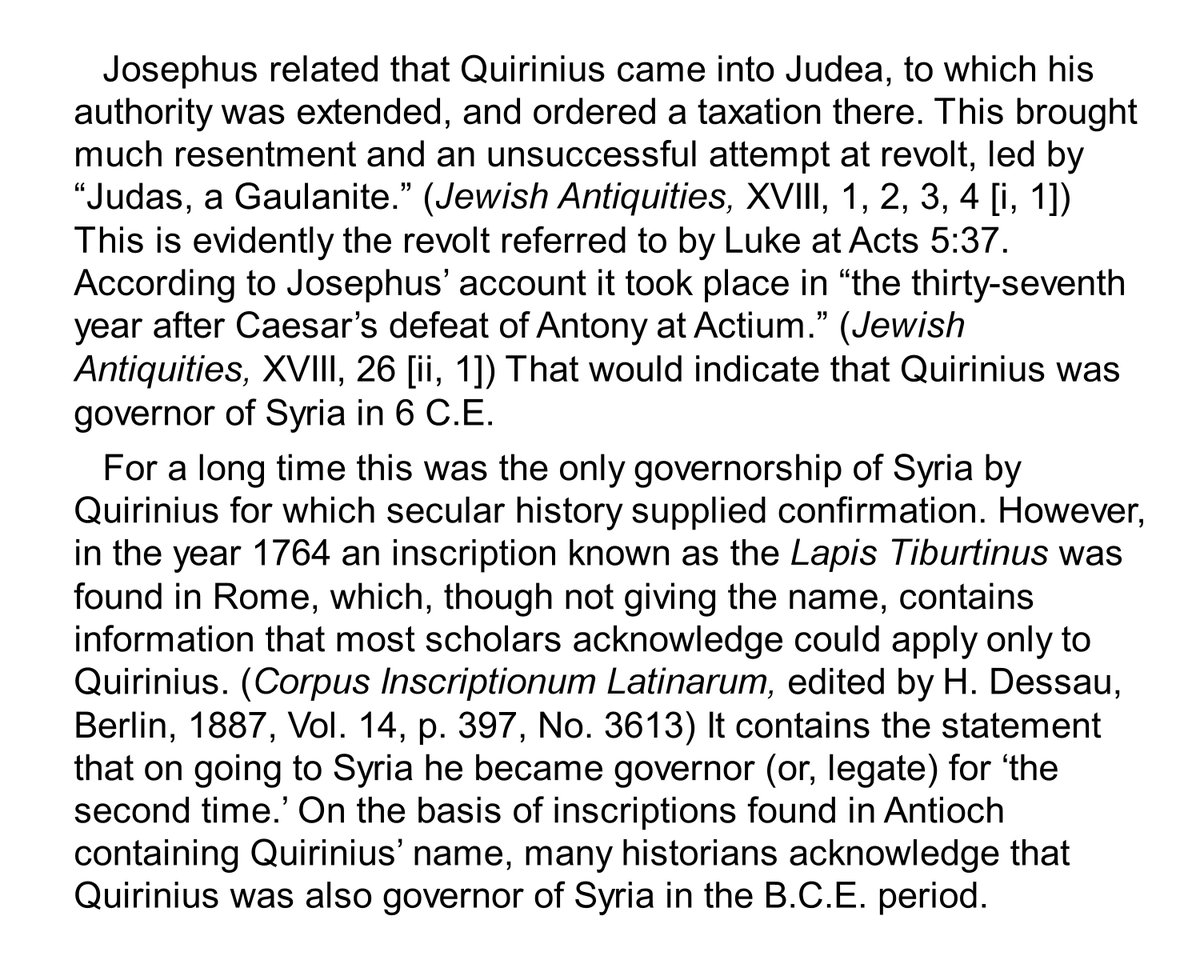Now, we have eclipses in 5 BC, 4 BC and 1 BC in roughly the right area. 4 BC is taken as the correct one, based on his sons' reigns and numismatic evidence, but traditionally a date of 1 BC had also been accepted (hence the calendar). The historical grounds for 4 BC are quite strong, but if you play around with Herod ruling conjointly with his sons, or a on/off regency during his final illness, people have argued that the archaic 1 BC date could also work. This would give us 2 or 3 years during our phantom proconsulate for Quirinius to perhaps be active. This method requires quite a lot of conjecture though, and runs afoul of much of our accepted chronology.
Anyway, on Theophilus, you do know the theory that it was written to a Roman official? The introduction of Luke uses a word meaning "most esteemed" when referring to him: 'kratiste'. This was a common form of address to Roman officials by provincials, and along with the language of having 'carefully investigated' and 'consulted eyewitnesses', this makes Luke look very similar to petitionary letters to Governors or supportive letters in courts of law in Hellenistic times.
Theophilus means 'lover of God', so may just be a generic title for any reader, but the Copts argue it was written to a specific Theophilus in Alexandria, while some argue it was written to the High Priest Theophilus.
The use of the title 'most esteemed' and the legal language however, perhaps supports the idea that it was written for Paul's court case in Rome, after he appealed to the Emperor. It would thus likely be addressed to the Praetor in his case or Paul's defence.
It is also possible that it was written to an eastern proconsul to support Christian claims, similar to petionary apologia sent to Pliny by Christian adherents later in Bithynia or Justin Martyr's works addressed to the Emperor Antoninus Pius.
Another possibility, explored by Paul Maier and supported by some contextual and mediaeval traditions that he may have been a Christian convert or that his wife might have been, is that it was written to Flavius Sabinus - the prefect of Rome and the future Emperor Vespasian's brother. If this last option is correct, then Flavius Sabinus would certainly know Quirinius, or at least his family, quite well.
there is a reference to an empire wide registration of all the Roman people not long before
5 February 2 B.C. written by
Caesar Augustus himself: "While I was administering my thirteenth consulship [2 B.C.] the senate and the equestrian order and the entire Roman people gave me the title Father of my Country" (Res Gestae 35, italics added).
This award was given to Augustus on
5 February 2 B.C., therefore the
registration of citizen approval must have taken place in
3 B.C.
Orosius, in the fifth century, also said that Roman records of his time revealed that a census was indeed held when Augustus was made "the first of men"--an apt description of his award "Father of the Country"--at a time when all the great nations gave an
oath of obedience to Augustus (6:22, 7:2). Orosius dated the census to
3 B.C.
And besides that, Josephus substantiates that an oath of obedience to Augustus was required in Judea not long before the death of Herod (Antiquities I7:4I-45)...
an inscription found in Paphlagonia (eastern Turkey), also dated to
3 B.C., mentions an "oath sworn by all the people in the land at the altars of Augustus in the temples of Augustus in the various districts."
the early (fifth century) Armenian historian, Moses of Khoren, said the
census that brought Joseph and Mary to Bethlehem was conducted by Roman agents in Armenia where they set up "the
image of Augustus Caesar in every temple.''. The similarity of this language is strikingly akin to the wording on the Paphlagonian inscription describing the oath taken in 3 B.C. These indications can allow us to reasonably conclude that the oath (of Josephus, the Paphlagonian inscription, and Orosius) and the census (mentioned by Luke, Orosius, and Moses of Khoren) were one and the same. All of these things happened in 3 B.C."
This 'father of the people' was understood to apply to the entire Roman empire, which, as we have seen, included anything and everything under Roman power.
"In 2 BC, the title PP was conferred on Augustus by the Senate, the equestrian order and the people of Rome (fast. Praenestini CIL V Z33; R. Gest. div. Aug. 35; Suet. Aug. 58, cf. an inscription from Sion dating to as early as 8 BC, ILS 6755). For the first time, the title referred to the salvation of the entire patria (i.e. the population of the imperium Romanum; for the terminology cf. [4. 3Z9, 3 31 f.I), who were now placed under the Mela of Augustus as pater."
Eusebius of Caesaria. Also dated the native iti census to 3 to 2 BC.
If Herod the great lived until one BC. Everything seems to align. There was a major census. Everywhere from Egypt to Armenia. Around 3 BC. For the ULTIMATE purpose. Of acknowledging the Divinity of Augustus. What more spiritually fitting time for the Messiah to be born? The truly divinely ordained. Messiah, born at the time that a mortal man was claiming divine honors. Across North Africa in Eurasia.

